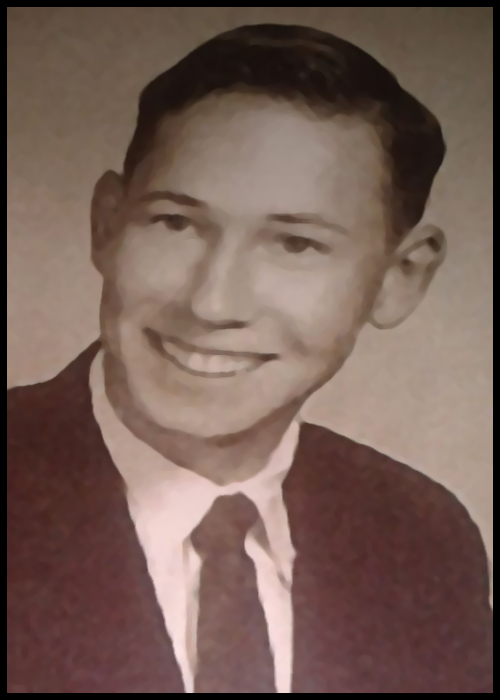Robert Van Atta

Remembering Robert Van Atta
An Idyllic Life
Bob Van Atta and Winnie Van Atta had finally found true love after both enduring failed marriages. The couple met while working together at Shaw Barton, a company that made calendars and sold promotional items. Bob was the manager of the accounting department and Winnie was a customer service representative. They immediately became friends and their friendship eventually blossomed into a loving relationship.
Bob had two young sons and a daughter from his previous marriage, and Winnie had two young boys as well. Bob and Winnie spent every waking moment together. Their blended family was filled with joy and love. Bob’s children would spend much of their time with him. Bob was a great dad and Winnie’s boys called him “Daddy Bob.” He spent time playing and doing things with Winnie’s sons and loved them like he loved his own children. Bob and Winnie soon married and moved to a big house to accommodate their large family.
All was perfect until September 25, 1984, a mere 25 days into their marriage. It was a typical morning and Bob and Winnie headed to work as usual. Bob had promised to take his seven-year-old son to soccer practice after school. That afternoon, his son sat on the porch waiting for a father who would never come home again. By the end of the evening, Winnie would be a widow and five children would be left without a father.
A Brutal Murder On A Busy Street
On Tuesday September 25, 1984, Robert and Winnie Van Atta left work and headed to their car. As they were walking, Winnie’s ex-husband, Charles Holmes, approached them. Holmes then pulled a gun from his pocket and shot at Robert and Winnie. As Robert fell to the ground as a result of his wound, Holmes stood over him and fired three more shots. As people walking the busy downtown street began running and screaming, Holmes grabbed Winnie with one hand while he held the gun in the other. Winnie was bleeding from her arm, where one of Holmes’ bullets had struck her. Holmes then forced Winnie into the back seat of his car.

Sheriff’s deputy David Foster arrived on the scene to find Robert Van Atta bleeding on the ground in the middle of the street. He then saw Holmes in his car with a terrified Winnie Van Atta sitting next to him with a gun pointed at her. As Deputy Foster approached the vehicle, Holmes got out of the car told him, “Back off or I’ll kill her.” Deputy Foster was terrified of an innocent person in the area being shot but knew that if he did not act quickly, Winnie would likely be killed. Deputy Foster fired a perfect shot and hit Holmes in the shoulder; he dropped the gun and fell to the ground. Holmes was arrested and Winnie was pulled from the back seat of the car by auxiliary police officer Tom Bradshaw, who happened to be at an auto parts store across the street. Robert Van Atta was rushed to the hospital with bullet wounds to his back, his chest and his left thigh. He was pronounced dead a few hours later as a result of internal bleeding, secondary to the bullet wounds.
A History Of Mental Illness And Threatening Behavior
Winnie Ellis had met Charles Holmes during high school. While dating in high school, they decided to get married after graduation. Holmes was 20 and Winnie was 19. They divorced a year after they were married and remarried a year later after Holmes enlisted in the Air Force. Winnie became pregnant with their first son and things were great. When their son was a year old, Winnie noticed Holmes’ behavior changing. One time, Holmes called her at her friend’s house and told her Magic Johnson was in their living room and he was showing him his handgun. Winnie and her friend were so concerned they got Holmes to the military base hospital, where he was admitted to the psychiatric ward. Holmes was diagnosed as manic-depressive and was told he would need to take medication for the rest of his life.
For the next ten years, Holmes would continue to display erratic behavior and had issues holding down a job. Winnie did her best to keep their family together; however, when she found Holmes drinking while babysitting their two boys, Winnie decided it was time to leave. Her opportunity came when Holmes agreed to admit himself to a psychiatric hospital after threatening to hang himself. Winnie packed her bags and she and her two boys moved in with her parents. After his release from the hospital, Holmes moved in with his parents.
Shortly after their separation, Holmes began to threaten Winnie. The threats became so severe that Winnie and her parents had to lock themselves in their home. Winnie’s father often carried a gun in his pocket around the house. Winnie’s job moved her desk to a safer area to protect her in the event Holmes came to their office. Despite all their precautions, nothing was going to deter Holmes from getting back at Winnie for leaving him. Holmes’s anger would culminate on that busy street a year after his separation from Winnie.
A Killer Escapes The Death Penalty And Gets Life
Prosecutors charged Holmes with aggravated murder with death penalty specifications. As Holmes prepared for trial, he and his attorneys realized that Holmes’ mental illness was a strong defense. Holmes pled not guilty and not guilty by reason of insanity. He was subsequently sent to a mental institution for further review. Defense attorneys also told the judge they would file a motion to dismiss the charges on the grounds Ohio’s death penalty law was unconstitutional.
Facing Charles Holmes’ severe mental issues, and to avoid an injured Winnie Ellis from enduring a long trial, prosecutors decided to accept a plea agreement. Holmes agreed to plead guilty to murder with a gun specification and to kidnapping. At sentencing, prosecutor Williams Owens made it clear to the judge that, per Holmes’s own psychologist, Holmes “could kill again.” He also stated the facts showed that it is likely that Holmes went after Van Atta because he was a father figure to Holmes’ two sons.
During sentencing, Holmes gave a long-winded, 30-minute speech. Although he shot Winnie and threatened to kill her, he claimed he never intended to injure her. Holmes claimed he felt totally unloved, even though he was living with his parents, who were taking good care of him. He claimed he “had a murderer’s heart for more than a year and a half,” during which time he wanted to take his own life. Holmes said he had forgiven himself, which “was the hardest thing to do.” He then said the parents of Robert Van Atta should forgive him “for their own sakes.” During the speech, Holmes spent 30 seconds explaining his own actions and the rest of the time was spent talking about what others did to him.
Judge Richard Evans then sentenced Charles Holmes to 23 years to life in prison for killing Robert Van Atta and kidnapping Winnie Van Atta.
A Lifetime Of Pain
Holmes’s horrific crimes would leave an everlasting effect on two families. Winnie would recover from her injuries, however there would be permanent damage to her right arm. She would need to relearn how to use her right hand, which also suffered permanent damage. She eventually was able to write, however she would never again be able to do many things she enjoyed including bowling, tennis and playing piano. Her two children lost the only real father they had ever known and will spend the rest of their lives dealing with the fact that the man that fathered them is a cold-blooded killer who also disabled their mother.
Robert Van Atta’s children would spend the rest of their lives without a father, forced to grow up at a young age. The two older children would raise their younger brother while their mother worked to support the family. Mr. Van Atta would never see his sons excel at sports, would not see any of his children graduate, and his grandchildren will never get to meet their grandfather.
Concerning Rehabilitation
Holmes has done fairly well in prison, likely because he is forced to take medication, although he continues to have several mental issues. The most concerning episode in regards to Holmes came in 2013, 29 years after being sent to prison. Holmes, for no apparent reason, walked up to a fellow inmate who was eating and hit him in the head, knocking him to the floor. He then stood over the inmate with a clenched fist telling him to get up.
As far as rehabilitation, Holmes has failed to take classes to address his criminal behavior. In 33 years, he has yet to take a recommended victims awareness class and still has not completed recommended mental health services classes. Holmes also has no solid parole plan and, if released, would likely go to a nursing home or permanent support housing program.
UPDATE: Murderer Charles Holmes died in prison on June 12, 2018. We thank everyone who submitted a petition to help keep Holmes in prison for his maximum sentence. Justice has been served.’Rest In Peace Robert Van Atta. You will never be forgotten.